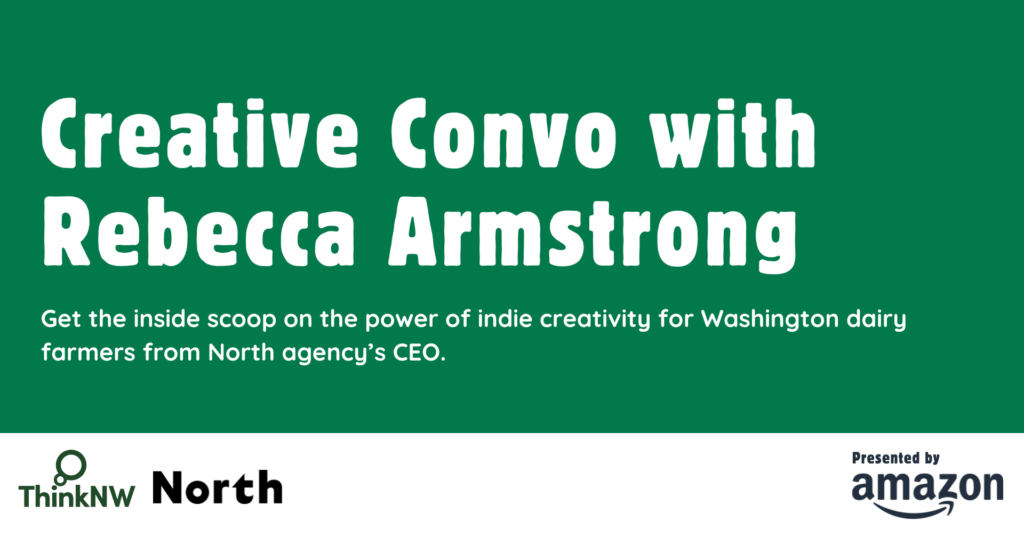Ad Agency, North, Thinks Radious Is the Office of the Future

And just like that, their 9,000-square-foot lease was gone. Actually, it took a little bit of negotiating with their landlord, but in the end, they found freedom.
In mid-2020, when Rebecca Armstrong, CEO of Portland-based ad agency North, realized her team would be working remotely for the long term, she began questioning the need for a permanent office. She analyzed the economics and determined that post-pandemic, it wouldn’t make sense to pay for office space seven days a week when her team only needed to be together in person occasionally.

Amina Moreau, CEO of flex space startup Radious, caught up with her to learn how she’s approaching collaboration, culture, and creativity as the future of work evolves.
North has been using Radious, an online platform for booking on-demand workspaces in residential neighborhoods, for a few months now. Rebecca took some time to share her experience, her perspective on team dynamics, and how she’s navigating hybrid work. The conversation below has been lightly edited for brevity and clarity.
Why, ultimately, did you give up your space?
In 2020, we were still in a 9,000-square-foot office that we had since 2006. We were already thinking, “this is a silly amount of space for the people we have and for the kind of work we do.” We were already exploring different ways of working, and the pandemic accelerated that process.
There were days pre-pandemic when the office was bustling, everyone was there, we had client meetings, and a lot was happening. But there were also other days when it was mostly empty, and you’d think, “man, the cost of heating all of this is really… the expense of maintaining a large space doesn’t seem necessary.” On those days, it felt empty and lonely.
I hear arguments about how everyone needs to come back to the office because it fosters collaboration and constant idea generation… but those conditions were available to them before the pandemic, and it wasn’t happening. Now, technology allows us to work from anywhere and have meaningful collaborations.
“…which doesn’t mean it’s not a good idea to get together once in a while, which might lead to your next question.”
You read my mind. Why do you make a point to regularly meet with your team in person?
We found that the biggest disadvantage of remote work, and this wasn’t just our experience, we actually researched it extensively on a national basis, is the sense of isolation and loss of community. You don’t need togetherness all the time, and you can find it, to some extent, through other community outlets. But there is tremendous value in meeting up and collaborating in person once in a while.
Even breaking bread together is an important part of building culture and community. That’s why I was interested in the Radious model, which allows us to do that whenever we want.
Currently, we meet in person once every other week, and we’re testing how that goes. I could see it becoming a weekly occurrence. It’s a nice way to see each other and definitely much cheaper than renting an office.
So I can’t imagine you’re considering any long-term office spaces now, or are you?

We’re exploring options. We were looking at a space around the time we were giving up the old one — a 2,500-square-foot space in East Side Portland. But we’re not committed to that idea, and honestly, if the Radious service proves to be as useful for us in the long run as it has been so far, then I’m definitely rethinking that option.
And what would it take for the Radious service to prove itself so valuable that you don’t sign a traditional lease?
“I think it’d be the reassurance that we can get consistent access to the type of space that we need. Right now, we have a Radious workspace that we really like, but we realize it may not always be available to us. I don’t know if there’s a way to book it out for a year or something?”
Actually, yes. While we specialize in by-the-day bookings for maximum flexibility, we can make longer terms work.
Great. I think that’s a great idea.
And what has the experience been like using Radious so far, especially considering the fact that you specialize in residential workspaces?
It seemed very “North” for us to meet in a work-outfitted house because there’s something kind of family-like about North. In our old office space, we had a massive kitchen right in the center, and a lot of North revolved around food. Communing around the table has always been important to us.
So that’s another reason to try Radious because as we browse through your properties online, we look for those with great kitchens. Our top cook, Peter Calandra, will go in and start cooking up a storm first thing in the morning.
When we get to the space, there’s the smell of banana bread and the promise of an excellent lunch. We meet as a team to talk about the state of the agency, and then we split into smaller work groups. The latest property we booked had several breakout rooms, so we could easily split up for various purposes.
It was just nice to have human chatter around the place for the day.
Do you envision North using Radious spaces for pitching creative ideas and hosting client meetings, or will you do that virtually?

I think it’s a combination of both. We have a creative presentation tomorrow, and due to the weather, it will probably be virtual. Nobody wants to drive over the pass because there could be a lot of snow tonight. But there will always be times when it’s such a critical presentation that we want to see each other in real life, to see the whites of people’s eyes — with good A/V, which Radious has.
To learn more about North, please visit www.north.com. For more information about Radious’s flexible workspace model, please visit www.radious.pro.



